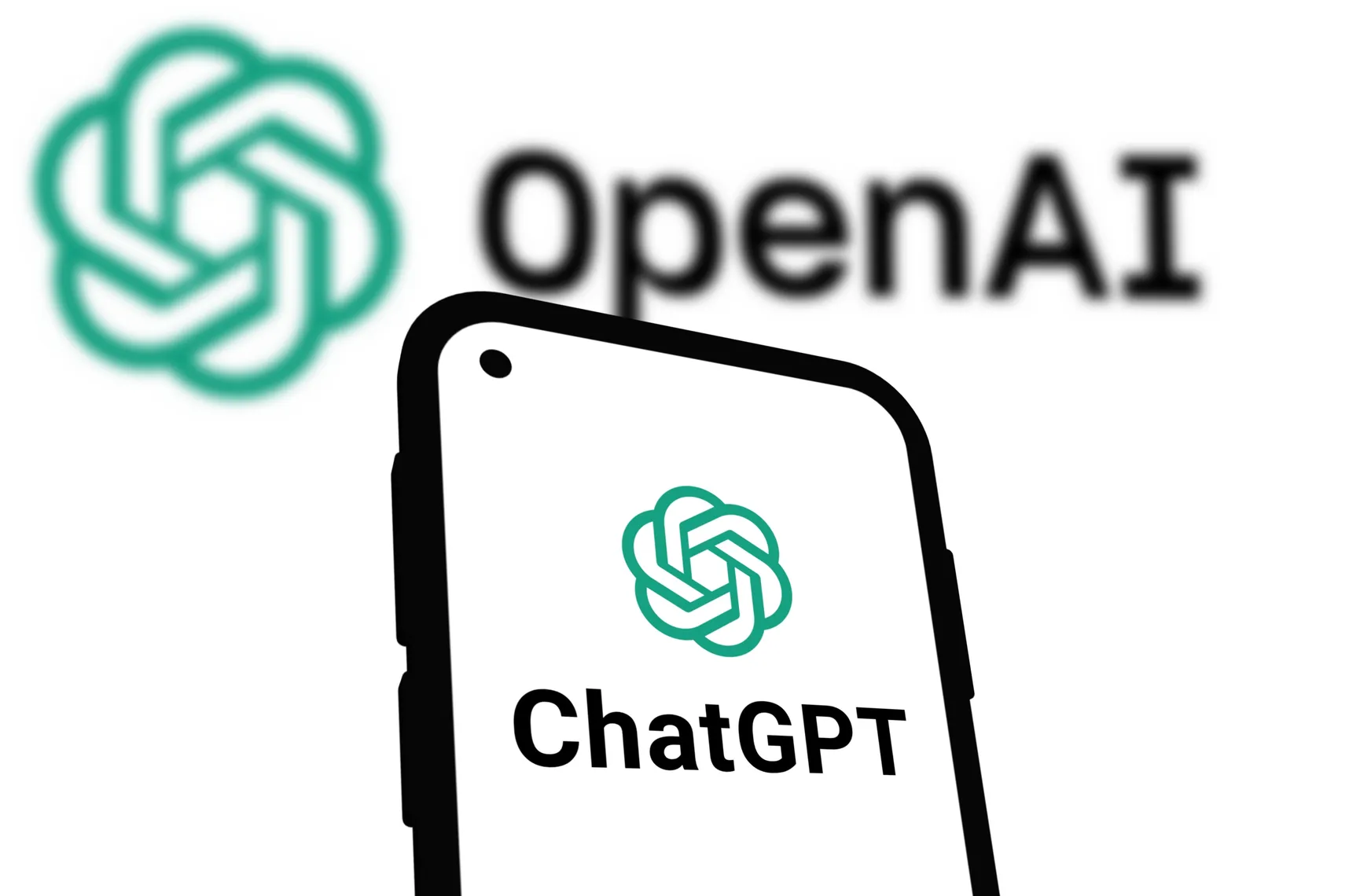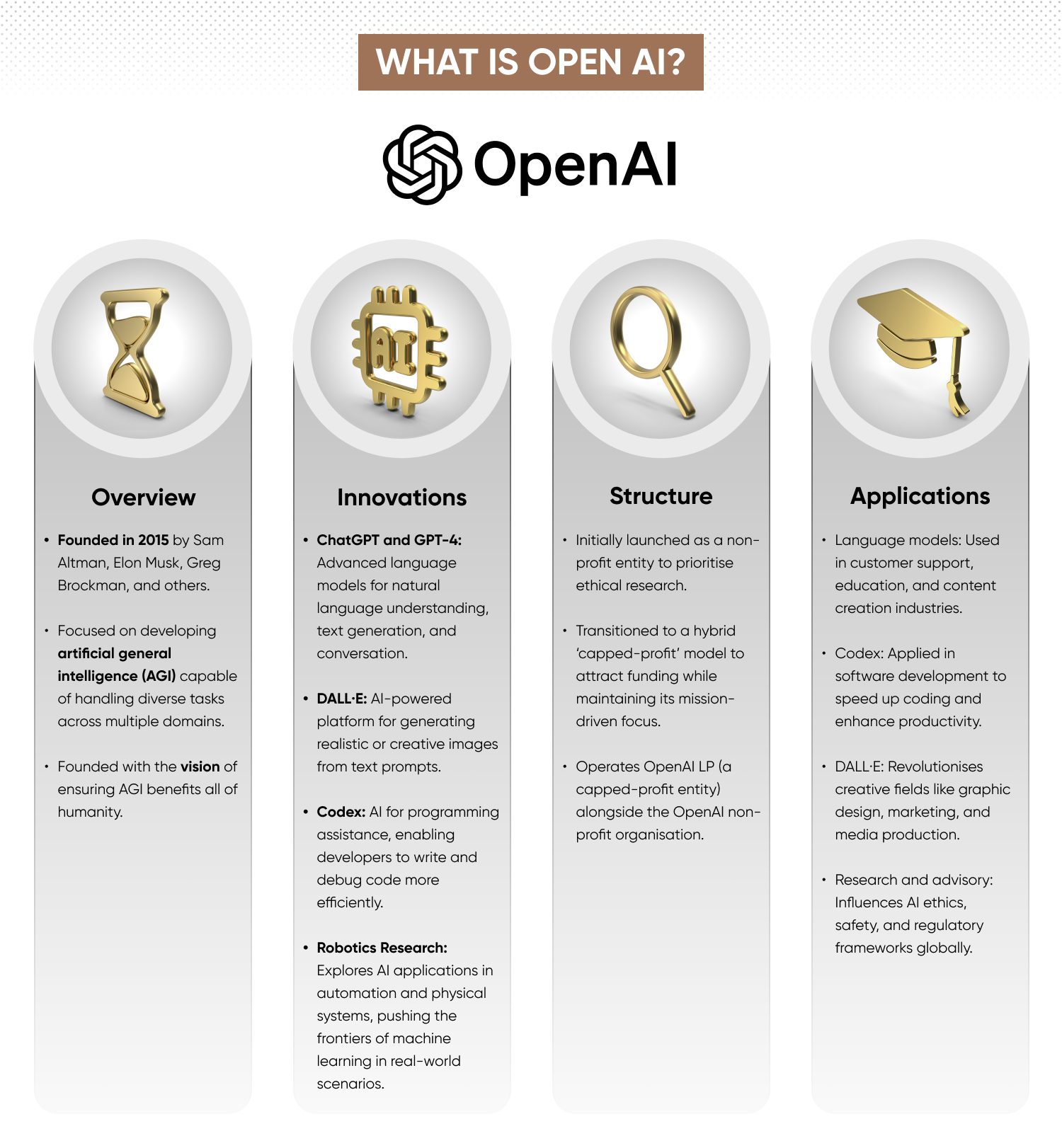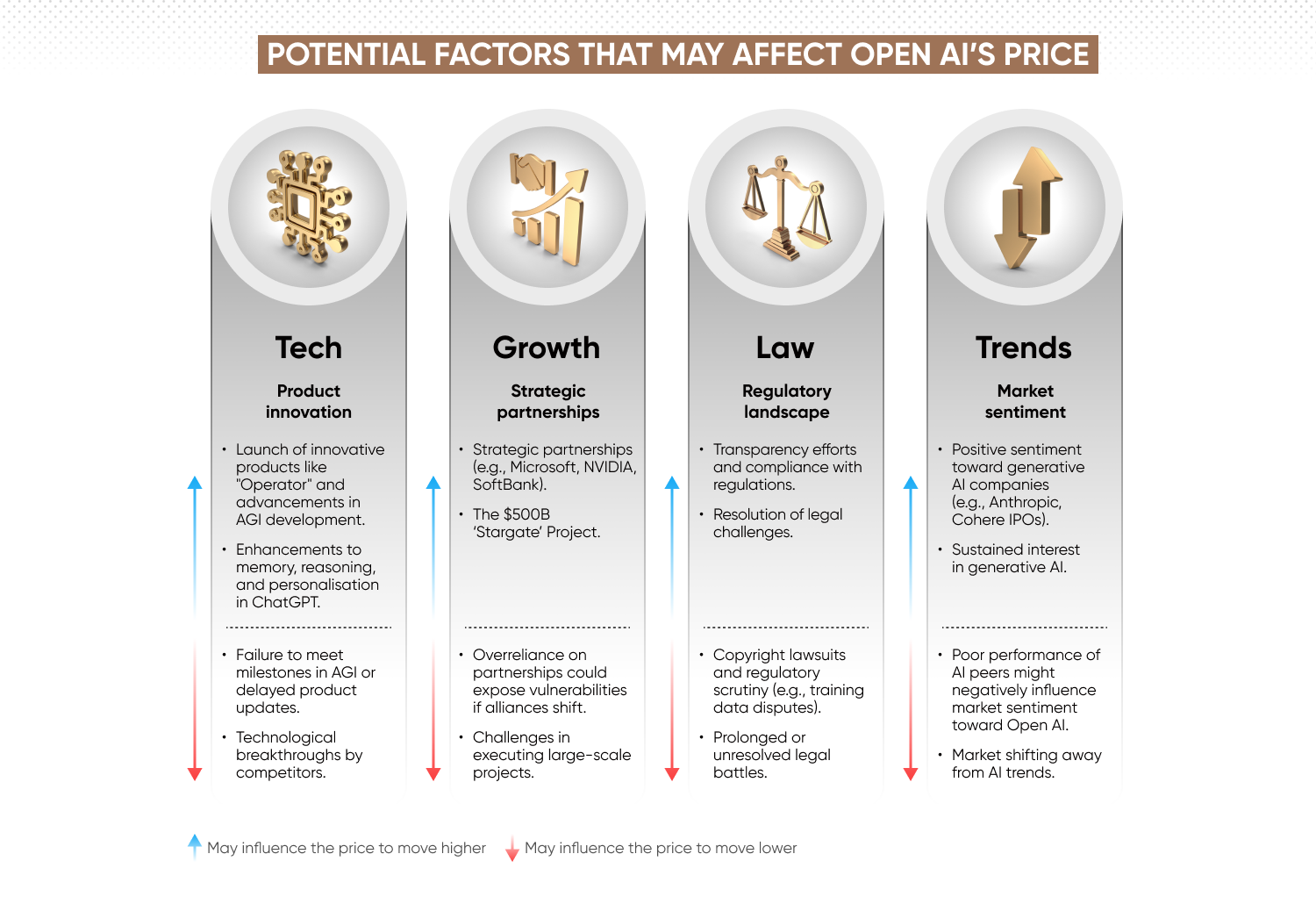Open AI IPO - how to trade OpenAI stocks

Find out more about OpenAI's upcoming IPO, explore potential price drivers, and learn how you can trade AI stocks using CFDs.
When is the OpenAI IPO?
OpenAI has not announced an official initial public offering (IPO) date. As of 26 February 2025, OpenAI operates under a ‘capped’ for-profit model, attracting strategic investors – including tech giant Microsoft – while remaining closed to public shareholders. While no official date has been announced, reports suggest that OpenAI is considering an IPO within the next two years.
Until the company provides details on a possible IPO, investors wishing to gain exposure to OpenAI’s technologies may consider indirect routes, such as investing in partner firms like Microsoft. Some choose to follow partner firms involved in AI initiatives or monitor relevant industry developments. However, without a formal listing, direct access to OpenAI equity remains unavailable.
What is OpenAI?
OpenAI is a private artificial intelligence research laboratory co-founded in 2015 by technology entrepreneurs and researchers, including Sam Altman and Elon Musk. It was established with the goal of advancing AI research and developing artificial general intelligence (AGI) that benefits humanity.
While early AI projects largely targeted specialised processes, OpenAI’s products are designed to perform a broad range of tasks. OpenAI has made significant contributions to AI research, particularly in language processing. Their notable releases include large language models such as ChatGPT and GPT-4, as well as image-creation platforms like DALL·E.
The company's structure has evolved over time. In 2019, OpenAI created a ‘capped-profit’ subsidiary, OpenAI LP, while OpenAI Inc. remained the parent non-profit entity. Elon Musk stepped down from OpenAI’s board in 2018, citing potential conflicts of interest due to Tesla’s own AI initiatives. In 2024, Musk filed a lawsuit against OpenAI, its CEO Sam Altman, and its President Greg Brockman, alleging that they prioritised profits and Microsoft’s commercial interests over OpenAI’s original mission of AI safety.

OpenAI generates revenue through a mix of enterprise partnerships, API access, and consumer subscriptions. The company offers GPT-powered services to businesses via the OpenAI API, enabling developers to integrate AI capabilities into their own applications. Additionally, OpenAI monetises its ChatGPT product through ChatGPT Plus, a paid subscription model offering faster access and premium features.
Another major revenue stream comes from enterprise AI solutions, where OpenAI provides custom models and AI infrastructure to large corporations. OpenAI also benefits from strategic investments, such as its partnership with Microsoft, which integrates OpenAI’s models into Azure and other Microsoft products. This combination of subscriptions, business licensing, and cloud partnerships forms the core of OpenAI’s business model.
What might influence the OpenAI live stock price?
The live stock price of OpenAI – if and when it goes public – could be shaped by a variety of factors, including its technological advancements, partnerships, market sentiment, and regulatory environment.
Product launches and technological advancements
OpenAI’s stock could gain from breakthrough innovations like ‘Operator’, an AI agent for browser-based automation, launched on 23 January 2025 for ChatGPT Pro users in the US. As it scales globally, alongside updates to ChatGPT’s memory, reasoning, and personalisation, market interest may rise.
However, delays, scalability issues, or competition from rival AI firms could dampen sentiment. Operator’s success isn’t guaranteed – if adoption lags, privacy concerns emerge, or performance falls short, confidence in OpenAI’s technical roadmap may weaken.
Strategic partnerships
Strong partnerships, especially with Microsoft, which provides Azure cloud infrastructure and significant funding, can bolster OpenAI’s growth. The Stargate Project, a $500 billion AI infrastructure initiative announced on 21 January 2025 with SoftBank, Oracle, NVIDIA and Microsoft – could enhance OpenAI’s valuation ahead of an IPO. However, over-reliance on key partners poses risks. Shifts in Microsoft’s priorities, resource reallocation, or execution challenges in large-scale projects like Stargate could introduce uncertainties.
Financial performance and revenue growth
Projected annual revenue of $11.6 billion by 2025, fuelled by ChatGPT Pro subscriptions, enterprise licensing, and the o1 model launched on 5 December 2024, could drive stock performance. These innovations aim to lower costs and enhance software development efficiency. Yet, meeting revenue targets isn’t assured – slower enterprise adoption, intensifying competition, or concerns over OpenAI’s capped-profit structure could limit its ability to scale profitably.
Regulatory and legal challenges
Proactive AI governance and regulatory engagement could strengthen OpenAI’s credibility and attract investment, particularly if it leads in responsible AI frameworks. However, ongoing legal battles – such as the copyright lawsuit filed in October 2024 over model training practices – may introduce risks. If unresolved, these disputes could undermine confidence in OpenAI’s compliance strategy.
Market sentiment towards AI
Investor appetite for AI-related IPOs could support OpenAI’s stock price, given its reputation as an industry leader. However, growing competition from firms like DeepSeek – which recently made headlines with high-performance AI models – could shift sentiment. If DeepSeek or other rivals secure key partnerships or technological breakthroughs, OpenAI’s competitive position may come under scrutiny.
Macroeconomic influences
Favourable market conditions, low interest rates, and strong AI adoption could help sustain OpenAI’s valuation. However, economic headwinds, such as rising interest rates, inflation, or geopolitical instability, could weaken investor confidence in high-growth, high-risk companies. A downturn in the tech sector or broader equity markets could weigh on OpenAI’s stock performance.

How to trade Open AI stocks
When, and if, OpenAI makes its stock available to the public, there are several steps that traders will need to follow in order to buy shares. Here is a brief guide on how to proceed:
- Choose a brokerage platformSelect a reliable broker that offers access to OpenAI shares. Trading platforms like Capital.com allow trading via contracts for difference (CFDs), allowing speculation on price movements without owning the underlying asset.
- Set up a trading accountOpen an account with your chosen platform, providing necessary personal information. You may need to verify your identity.
- Deposit fundsFund your account using a bank transfer, card, or other methods. Ensure you have sufficient capital for your trades.
- Monitor stock performanceOnce listed, track OpenAI’s stock using real-time data. Follow the company’s news and financial releases that could affect its valuation.
- Place a tradeWhen ready, place a market or limit order to buy shares. Consider using stop-loss orders to manage risk.
Learn more about contracts for difference in our CFDs trading guide.
Looking into trading fintech stocks? Learn more about eToro's upcoming IPO.
Which AI stocks can I trade?
While OpenAI stock remains unavailable as the company has not formalised any plans to go public, traders can explore a range of AI-related stocks that are already publicly traded. These companies offer exposure to the growing AI sector and can be traded via CFDs. Below are some notable examples:
- Microsoft (MSFT): Microsoft is one of the largest AI stocks by market capitalisation. The tech giant’s 2019 partnership with OpenAI and subsequent multi-billion-dollar funding rounds have strengthened AI’s role within its ecosystem. Some notable AI-driven Microsoft initiatives include Azure AI, GitHub Copilot, and Microsoft 365 Copilot. Learn more about how to trade Microsoft CFDs.
- Nvidia (NVDA): Nvidia is a leading player in the AI hardware market, known for its GPUs, which are essential for training and deploying complex AI models. The company’s AI platforms are used by data centres, autonomous vehicles, and deep learning applications. Learn more about how to trade Nvidia CFDs.
- Alphabet (GOOGL): Alphabet, the parent company of Google, incorporates AI in its core services, such as Google Search, YouTube recommendations, and Google Assistant. Alphabet’s AI projects, including its DeepMind subsidiary and the Gemini AI platform, help to drive innovation across its product portfolio. Learn more about how to trade Alphabet CFDs.
- C3.ai (AI): C3.ai is a pure-play AI company specialising in enterprise software for predictive analytics and optimisation. Its tools are used across industries for applications such as supply chain management and fraud detection.
- SoundHound AI (SOUN): SoundHound AI focuses on voice and conversational AI technologies, offering solutions through its Houndify platform. These tools enable natural language understanding across various industries.
Read our comprehensive traders’ AI trading and best AI stocks guides.
How long until I can trade OpenAI stock?
OpenAI remains a private entity, so there is no direct access to its shares on public markets. Until the company announces a listing, you cannot buy or sell OpenAI stock via a traditional exchange or CFD platform.
Speculation around a potential IPO is ongoing, but there has been no firm guidance on timing. Traders keen to track OpenAI’s progress often monitor partner organisations, such as Microsoft, which hold stakes in its technology.
Should the company move forward with an IPO, details on share offerings, listing venue, and relevant regulatory approvals would follow. Until then, direct trading of OpenAI’s equity will remain unavailable.
FAQs
What is OpenAI?
OpenAI is a private artificial intelligence research organisation co-founded in 2015 by Sam Altman, Elon Musk (who later departed), and other tech leaders. Its mission is to ensure artificial general intelligence (AGI) benefits humanity. Notable tools developed by OpenAI include ChatGPT and DALL-E. OpenAI operates as a nonprofit with a for-profit subsidiary under a capped-profit model and collaborates with partners like Microsoft to integrate AI solutions across industries.
Can I trade ChatGPT?
No. ChatGPT is a product developed by OpenAI and not a tradable asset. While OpenAI remains a private company, its technologies, including ChatGPT, contribute to the broader AI ecosystem. Traders interested in AI exposure can consider publicly traded companies invested in or partnered with OpenAI, such as Microsoft.
When will OpenAI go public
As of now, OpenAI has not announced plans for an initial public offering (IPO). The company remains privately held, with funding from strategic investors like Microsoft. While there is speculation about a potential IPO, no official timeline or details have been confirmed. Traders should monitor OpenAI's announcements for any updates on its listing status.
Discover more upcoming IPOs
Stay informed on upcoming IPOs, market trends, and the newest trading opportunities

Discord IPO
